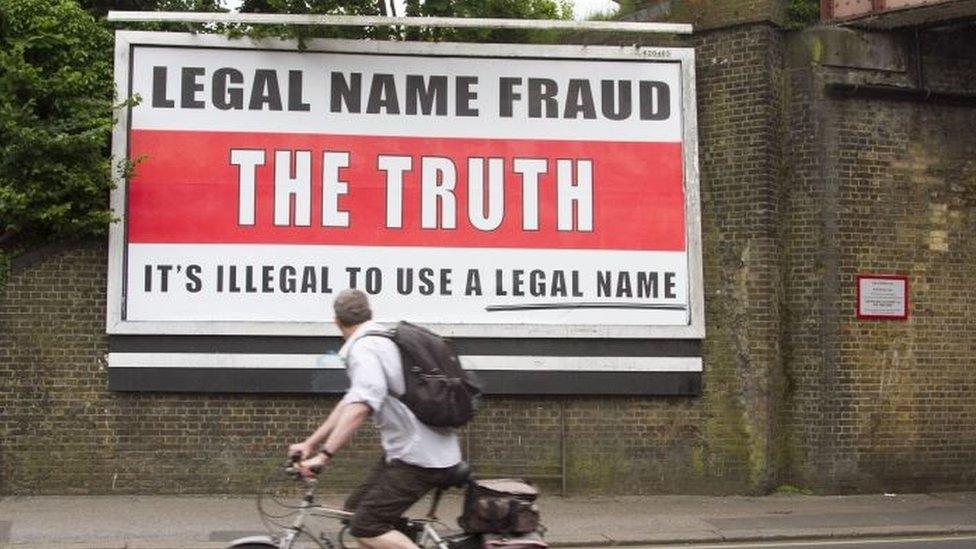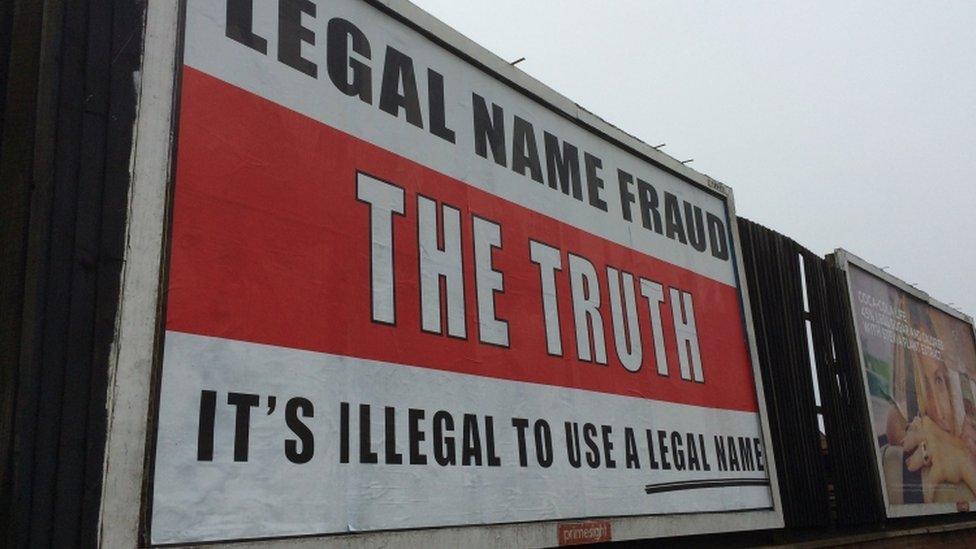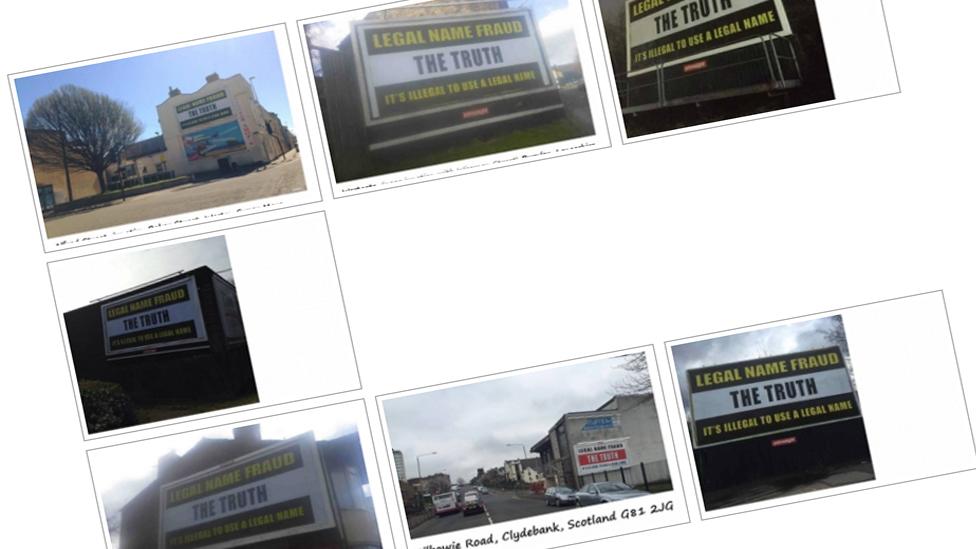The mystery of the 'legal name fraud' billboards
- Published

Scores of posters have appeared around the UK warning of "legal name fraud". What does this mean and who is paying for the adverts?
The message is spelled out in bold capital letters. "LEGAL NAME FRAUD," it says. Then below: "THE TRUTH." And finally: "IT'S ILLEGAL TO USE A LEGAL NAME."
The first time I saw the 10ft by 20ft billboard near my flat in Kilburn, north-west London, I stopped and stared, completely baffled. What was a legal name, exactly? Surely to say it was illegal was an obvious contradiction? And who on earth was behind the advert?
I'm not the only one to have been left puzzled. A quick Google search revealed similar posters have appeared in Birmingham, external, Dundee, external, Essex,, externalGloucester, external, Grimsby, external, Guildford, external, Lincoln, external, Liverpool, external, Plymouth, external, Reading, external, Southport, external, Teesside, external and Truro, external, and in each the local press has reacted with varying levels of bemusement.
A Facebook page, external dedicated to posting photos of the billboards includes dozens more. Another website has more than 120 images, external of "legal name fraud" posters.
But no-one seems to know what message these adverts are actually attempting to get across.
A further web search took me to a site called legalnamefraud.com, external, which outlines a theory that when your birth was registered, a legal entity - your legal name - was created. But the legal entity "Jane Smith" is distinct from the actual physical person Jane Smith, the website says.
When your parents registered your birth on the certificate, it insists, they unknowingly gave the Crown Corporation ownership of your name. "Simply thus, all legal names are owned by the Crown, and therefore using a legal name without their written permission is fraud."

Does this interpretation of the law have any validity? "Absolutely not. Absolutely none at all," says barrister, law blogger and lecturer Carl Gardner, external. "It's a kind of brew of pseudo-legal ideas. It's the equivalent of thinking Harry Potter is science."
The website includes numerous quotes by "Kate of Gaia" as well as articles and videos by her. It links to another website, which gives her full name as Kate Renee Thompson and provides a Canadian email address.
Gardner says legalnamefraud.com's arguments are similar to those of the "Freemen-on-the-Land" movement - a group of individuals who argue they are bound by laws only if they consent to them, often in the hope of escaping debts and criminal charges - and the related "Sovereign Citizen" movement. In 2012 a Canadian judge issued a 192-page judgement, external dismissing Freemen-style arguments.
The same year, Wilfred Keith Thompson - who, it was reported, preferred the name Katherine - from Guelph, Ontario, was described as a a "self-proclaimed, external" Freeman following an appearance in a Canadian court. In 2010, Thompson reportedly, external used a Freeman-style defence when charged with a parking offence.
When I emailed Kate of Gaia, she replied asking to be addressed as "JANE DOE-755" and urged me to "google legal name fraud and read the essays like millions of others did....be a real journalist vs. a talking B-B.C. talking pair-rot" (sic). She didn't reply to my enquiry about who funded the billboard posters.
A search on Whois.net, which lists the registered owners of websites, doesn't reveal any information about legalnamefraud.com. On the similarly named legalnamefraud.org, however, the owner is listed as "Dohm Teewatt" at an address in Quebec, Canada. A Dohm Teewatt Twitter page, external includes lots of posts about "legal name fraud". An email address is also provided by Whois.net, but when I sent it a message I received a reply from a "D-ohm T-Wat" consisting of nothing more than Kate of Gaia's email address.
None of this means that Kate of Gaia paid for the billboards - which potentially cost hundreds of thousands of pounds. It's also not clear why they appear across the UK when she appears to be based in Canada.
There are several videos on YouTube about the billboards, including one made in January, external in which a man with a north-of-England accent says there are "definitely another couple of hundred on the way".

Screengrab from one of "Kate of Gaia"'s websites displaying "legal name fraud" billboard posters
Other videos narrated by the same voice appear to have been shot in Lancashire, including one which identifies the town as Preston, external. Although the voice appears not to belong to "Kate of Gaia", the videos were posted using the name Jane Doe-755, suggesting at least some level of co-operation. Another video, external posted by Jane Doe-755 appears to be narrated by an English woman.
The Advertising Standards Authority (ASA) confirmed to me that it had received seven complaints about the posters on the basis that they were ambiguous or misleading.
"Some questioned whether it would lead law-abiding people into thinking they've committed fraud or a crime by having a name," a spokesman said.
However, the ASA said it did not consider there were grounds for further investigation. While it acknowledged the advert "may appear somewhat confusing to consumers and it wasn't initially clear what it was for or what it means", its message "was not particularly harmful, misleading or likely to cause widespread offence, and unlikely to cause consumers confusion regarding their own name".
For this reason, the ASA had not made contact with the advertiser and cannot shed any light on their identity.
I also drew a blank when I rang Primesight, which owns many of the billboards. A spokeswoman told me that client confidentiality prevented her from disclosing who had paid for the advertising space or how much they had been charged.
Regardless of who funded it, the campaign has won attention for a hitherto fringe theory. David Allen Green, the legal commentator and solicitor at Preiskel & Co LLP who blogs as Jack of Kent, external, says it is "complete tosh" and warns people against relying on it in court.
He adds: "It is nothing about law, and it is not harmless. Taking this daftness seriously can be legally dangerous. If people try to use such things to avoid their legal obligations they can end up with county court judgments or even criminal convictions. You may as well walk into court with a t-shirt saying 'I am an idiot'."
Next time I pass that billboard near my flat, I won't feel any less perplexed.
Follow Jon Kelly on Twitter@mrjonkelly, external
Subscribe to the BBC News Magazine's email newsletter to get articles sent to your inbox.